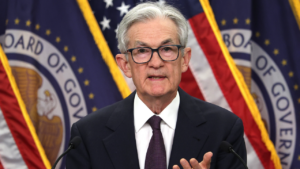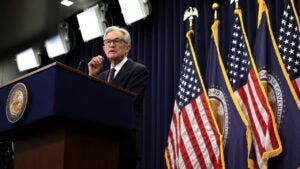Survey: 65% of Americans think tariffs would be bad for their personal finances

First came historic inflation and elevated interest rates. Then came aggressive tariffs, recession fears, market volatility and a tit-for-tat trade war. For years now, Americans have felt poorly about the U.S. economy — and new data from Bankrate suggests many people aren’t feeling better, even after electing a new administration to help them heal from higher prices.
More than half of Americans (56 percent) say they believe that the U.S. economy is headed in the wrong direction, according to Bankrate’s new Consumer Sentiment Survey. That’s virtually unchanged from a similar Bankrate poll published before the November 2024 presidential elections, when 55 percent felt the economy was on the wrong track.
What’s more, most Americans do not appear to support Trump’s signature remedy for the economy: increased tariffs. Among the policies either proposed or advanced by the Trump administration, Americans are the most downbeat about higher import taxes on foreign-made and imported goods. Roughly two-thirds (or 65 percent) believe tariffs will worsen their personal finances, with 41 percent believing they will “greatly” damage their money.
Inflation is slowing, and borrowing costs have also come down some since Trump’s election. President Donald Trump, meanwhile, is rushing to make his first-term tax cuts permanent before they expire at the end of the year, moves that could help prevent Americans from experiencing even more sticker shock with their purchasing power. Overshadowing any bright spots in the U.S. economy, however, are tariffs — which economists say are raising the risk of both more inflation and a recession.
Trump has moved further and faster with tariffs than he did in his first term. He’s slapped tariffs on steel and aluminum imports, as well as cars and auto parts, and announced a universal baseline 10 percent tariff on every country that trades with the U.S. He shocked the world even more in early April during his “Liberation Day” tariff announcements, instituting levies as high as 84 percent on countries who he alleges have created unfair trading barriers with the U.S.
Many of those harshest tariff hikes are currently facing legal challenges. Even so, the current U.S. tariff rate is the highest in nearly a century, costing the average U.S. consumer an extra $2,500 a year, according to estimates from the Yale Budget Lab. Those are costs few Americans had room to absorb in their budgets even before post-pandemic inflation. Since 2019, only about 2 in 5 Americans have told Bankrate that they’d pay an emergency $1,000 expense with their savings.
While tariffs are one of the president’s favorite policy tools, most Americans see higher taxes on imported goods as being a losing proposition for their personal finances. This, after they had previously identified inflation as the top economic issue of the 2024 presidential campaign.— Mark Hamrick, Bankrate senior economic analyst
Bankrate’s insights on Americans’ economic attitudes
Most Americans (56%) think the U.S. economy is on the wrong track, versus 26% who say it’s heading in the right direction and 17% who say they don’t know, Bankrate’s Consumer Sentiment Survey found.
Almost 2 in 3 Americans (or 65%) expect that tariffs will worsen their personal finances, versus 18% who say they will improve their finances. Another 7% say tariffs would have no impact and 10% don’t know.
Almost everyone (97%) has seen prices increase over the past year on at least one category of expenses. Americans were most likely to notice higher prices on groceries (91%) and dining out (75%), followed by gasoline (59%), consumer products (52%), cars or automotive services (47%), travel (40%), home services (39%) and personal care services (39%).

Bankrate Data Center
Intro text: Since 1976, Bankrate has been the go-to source for personal finance data, publishing average rates on the most popular financial products and tracking the experience of consumers nationwide.
See moreHere’s who thinks the U.S. economy is heading in the wrong direction
While roughly the same amount of Americans believe the U.S. economy is on the wrong track since the 2024 presidential elections, the share of Americans who say the U.S. economy is headed in the right direction has declined — falling to 26 percent in Bankrate’s latest poll from 32 percent in October 2024.
Another 17 percent in Bankrate’s latest survey say they don’t know which direction the U.S. economy is generally headed.
How Americans feel about the state of the U.S. economy largely depends on their political ideologies. Republicans were the only group in Bankrate’s survey more likely to believe that the U.S. economy is heading in the right direction, at 58 percent, versus 17 percent of Independents and 7 percent of Democrats.
On the other hand, most Democrats (83 percent) believe that the economy is headed in the wrong direction, compared to 58 percent of Independents and 27 percent of Republicans.
It’s not uncommon for Americans to feel more optimistic when their party is in control of the federal government. In October, 83 percent of Republicans believed the U.S. economy was on the wrong track, as opposed to 27 percent of Democrats and 62 percent of Independents.
“Partisanship is a powerful drug,” says Layna Mosley, a professor of politics and international affairs at Princeton University who specializes in trade policy. “If I identify as a Democrat and Democrats tell me that this is a good policy, many people are inclined to believe that.”
As for other groups, men (at 31 percent) are slightly more likely than women (at 24 percent) to believe that the economy is headed in the right direction. Both groups, however, are feeling less optimistic than they were in Bankrate’s prior poll, when 37 percent of men and 28 percent of women believed the economy was on the right track.
Young people, meanwhile, are significantly more downbeat about the U.S. economy than they were in Bankrate’s previous consumer sentiment poll, while older generations have become less pessimistic.
Americans who say the U.S. economy is on the wrong track, by generation:
| Generation | May 2025 | October 2024 |
|---|---|---|
| Gen Z (ages 18-28) | 63% | 43% |
| Millennials (ages 29-44) | 66% | 51% |
| Gen X (ages 45-60) | 46% | 62% |
| Baby boomers (ages 61-79) | 54% | 59% |
Americans are most downbeat about Trump’s tariff policies
When it comes to the specific reasons Americans are feeling downbeat about the U.S. economy, tariffs are emerging as the primary culprit.
Of all the policies either proposed or implemented by the Trump administration, Americans had the most concerns about tariffs. More than two-thirds (or 65 percent) of Americans said that increasing tariffs on foreign-made and imported goods would worsen their personal finances, while just 18 percent said it would improve their finances. Another 10 percent said they didn’t know what the impact would be, while 7 percent said tariffs would have no impact.
All surveyed groups were more likely to say that those policies would worsen their finances rather than improve them. That was the case even across party lines. Nine out of 10 (91 percent) Democrats say tariffs would have a negative impact on their personal finances, compared with 62 percent of Independents and 46 percent of Republicans. Meantime, 5 percent of Democrats said that tariffs would improve their finances, compared with 36 percent of Republicans and 13 percent of Independents.
Inflation is a primary motivator in voting behavior, according to research from Jesse Rhodes, a political science professor at the University of Massachusetts-Amherst who helps run the institution’s UMass Poll. It might not, however, trump one’s political beliefs, he says. Even in his own work, he’s seen Republican-leaning respondents acknowledge that prices could rise because of tariffs. Yet, Republicans are also more likely to believe those duties will successfully revive the manufacturing sector and bring back middle-class jobs — a key goal of Trump’s protectionist trade agenda.
Many Americans' baseline is that ‘Golden Age' of the immediate post-World War II era, the idea that you could have a single breadwinner, not college-educated, in a good union manufacturing job, and they could be middle class and send their kids to college. There’s a strong argument to be made that’s a big part of Trump’s appeal. That's what ‘Make America Great Again’ is, in part, about.— Jesse Rhodes, political science professor at the University of Massachusetts
Across generations, Gen Zers (at 65 percent), millennials (69 percent) and baby boomers (68 percent) were roughly in alignment that tariffs would harm their wallets. Gen Xers (at 25 percent) were more likely than any other age group to expect that tariffs would improve their finances, though 60 percent of them still believed tariffs would harm their finances.
Middle-income earners making between $75,000 and $99,999 were the most likely to think that tariffs would harm their finances, at 70 percent, though Americans making less than $50,000 a year (at 65 percent) and Americans making $100,000 or more a year (at 68 percent) weren’t far behind. Meanwhile, 59 percent of Americans making between $50,000 and $74,999 say that tariffs would harm their finances.
How Americans are feeling about the Trump administration’s other policy measures
Among the Trump administration’s other stances, Americans were most likely to expect that the president obtaining more control over the historically independent Federal Reserve, cutting taxes for the wealthy and shrinking the federal workforce would be more likely to harm their finances than help.
On the other hand, Americans appeared to support cutting taxes for small businesses, capping credit card interest rates and eliminating federal income taxes on Social Security.
How Americans feel Trump administration policy priorities could impact their finances
| Policy initiative | Improve | Worsen |
|---|---|---|
| Cutting taxes for small businesses | 58% | 9% |
| Capping credit card interest rates | 52% | 9% |
| Eliminating federal income taxes on Social Security | 51% | 12% |
| Increasing the child tax credit (CTC) | 37% | 7% |
| Forgiving student loan debt | 35% | 21% |
| Eliminating federal income taxes on tips | 34% | 11% |
| Deporting workers living in the U.S. illegally | 32% | 37% |
| Cutting the size of the federal workforce | 29% | 41% |
| Giving the president more control over the Federal Reserve | 23% | 50% |
| Cutting taxes for the wealthy | 18% | 45% |
Both Republicans and Democrats had roughly the same amount of support for expanding the child tax credit (CTC), with 40 percent of Democrats and 38 percent of Republicans saying the initiative would improve their finances. The same was true for capping credit card interest rates, with 55 percent of Democrats and 53 percent of Republicans supporting.
Republicans, however, were significantly more likely than Democrats to say that deporting workers living in the U.S. illegally, shrinking the size of the federal workforce and giving the president more control over Fed policy would improve their finances.
Almost half of Gen Zers and millennials (47 percent and 45 percent, respectively) said forgiving student loan debt would improve their finances, versus 34 percent of Gen Xers and 19 percent of baby boomers.
Where Americans are noticing higher inflation
Tariffs are threatening to lift prices at a time when many Americans still have some sticker shock from post-pandemic inflation. Almost all Americans (97 percent) say they have noticed higher prices than they’re accustomed to over the past year.
More Americans are noticing inflation today than they were when price pressures were nearing a 40-year high. Slightly more than 9 in 10 Americans (93 percent) told Bankrate in March 2022 that they had noticed higher prices than they were accustomed to. Meanwhile, 89 percent said the same in polling from August 2021.
Consumers are right to notice higher costs: Prices have risen 2.4 percent over the past 12 months through May, according to the latest data from the consumer price index (CPI).
Yet, inflation is expected even in the healthiest of economies. Policymakers at the Federal Reserve typically prefer that prices rise 2 percent each year — believed to be a not-too-hot, not-too-cold “Goldilocks” pace that gives the U.S. economy momentum to expand without robbing Americans of their purchasing power.
Whether tariffs can be blamed for those price hikes that consumers are noticing is another question. Rising goods prices — including on products such as household furnishings, apparel and computers — caught the eye of Fed Chair Jerome Powell back at the Fed’s March rate-setting meeting. The chief central banker said tariffs were likely to blame, though he also noted that the full tariff impact might not be visible for months.
When it comes to the specific places Americans say they’re noticing inflation, those include:
- groceries (91%);
- dining out (75%);
- gasoline (59%);
- consumer products (52%);
- cars/automotive services (47%);
- travel (40%);
- home services (39%);
- personal care services (39%); and
- other (4%).
“Food and energy are among key categories where Americans are most price-sensitive, in part because they represent things that we inevitably must purchase,” Hamrick said. “The challenge for the Federal Reserve has been to bring inflation down to its 2 percent target without keeping interest rates so high as to cause a recession.”
Worried about the state of the U.S. economy? Take these 3 steps
Americans have been forced to endure an enormous amount of volatility this year, whether that’s with their investments in financial markets, Trump’s volatile, stop-and-go tariff policies or up-again, down-again recession odds. Currently, economists have pegged the odds of a downturn by March 2026 at 36 percent, though experts note that depends on how high tariffs rise and how long they stay there, according to Bankrate’s latest Economic Indicator Poll.
Whether you’re worried about higher prices, a downturn or both, financial experts say nothing can help ease your mind more than coming up with a game plan.
“Economic cycles, including expansions and recessions, are inevitable facets of life,” Hamrick said. “Having sufficient savings, utilizing liquid, high-yield accounts, is one good way to protect ourselves during thick and thin.”
Bankrate commissioned SSRS (May 2025) and YouGov Plc (October 2024) to conduct each survey. Responses for both were mostly gathered from online questionnaires.
Why we ask for feedback Your feedback helps us improve our content and services. It takes less than a minute to complete.
Your responses are anonymous and will only be used for improving our website.
You may also like

Fed holds interest rates steady, resisting pressure from Trump





